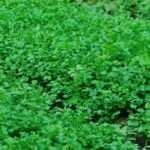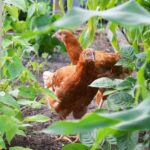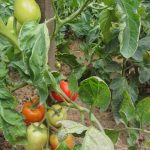Can horse manure be used in vegetable gardens to promote healthy plant growth and a bountiful harvest? Many gardeners are turning to organic fertilizers as a natural and environmentally-friendly way to nourish their vegetable plants. In this article, we will explore the benefits of using organic fertilizers in vegetable gardens and consider the potential option of horse manure as a fertilizer.
Using organic fertilizers in vegetable gardens offers numerous advantages, including improved soil structure, increased microbial activity, and a higher nutrient content. While there are various options for organic fertilizers, such as compost and animal manure, horse manure is gaining popularity among gardeners. It is essential to understand the pros and cons of using horse manure as a fertilizer in vegetable gardens, which we will delve into in the following sections.
In addition to discussing the benefits of using organic fertilizers like horse manure, this article will also provide practical guidance on how to properly use horse manure in vegetable gardens. By understanding the nutrient composition of horse manure and following safety precautions when using it, gardeners can maximize its potential while minimizing any potential risks. Let’s explore the advantages and considerations of incorporating horse manure into your vegetable garden’s fertilizer regimen.
The Pros and Cons of Horse Manure
Horse manure is often considered an excellent organic fertilizer for vegetable gardens due to its rich nutrient content. However, there are both pros and cons to using horse manure as a fertilizer, and it is important for gardeners to be aware of these factors before incorporating it into their gardening practices.
One of the main advantages of using horse manure in vegetable gardens is its high nutrient content. Horse manure is rich in essential nutrients such as nitrogen, phosphorus, and potassium, which can promote healthy growth and development in vegetable plants. Additionally, horse manure can improve soil structure and drainage when used as a soil amendment, making it beneficial for overall garden health.
On the other hand, there are some potential drawbacks to consider when using horse manure as a fertilizer. One concern is the presence of weed seeds in horse manure, which can lead to an increase in unwanted plants growing in the garden. Additionally, fresh horse manure may contain high levels of ammonia, which can be harmful to young plants if not properly composted beforehand.
Overall, while horse manure offers numerous benefits as a natural fertilizer for vegetable gardens, it is crucial for gardeners to understand how to properly use and prepare it to minimize any potential negative effects on plant growth.
| Advantages of Horse Manure | Disadvantages of Horse Manure |
|---|---|
| Rich in essential nutrients like nitrogen, phosphorus, and potassium | Potential presence of weed seeds |
| Improves soil structure and drainage | Fresh manure may contain high levels of ammonia |
How to Use Horse Manure in Vegetable Gardens
Using horse manure as a fertilizer in your vegetable garden requires proper handling and application to ensure the health and growth of your plants. Here are some step-by-step instructions on how to use horse manure effectively in your vegetable garden:
Choose Well-Aged Manure
Before applying horse manure to your vegetable garden, it is important to use well-aged manure. Fresh manure contains high levels of ammonia and can burn plant roots. Look for composted or aged horse manure that has broken down over time, as this will be safer and more beneficial for your plants.
Prepare the Soil
Prepare the soil in your vegetable garden by loosening it with a hoe or tiller. Spread a layer of well-aged horse manure over the soil surface, about 1-2 inches thick. Avoid placing the manure directly on top of plant stems or leaves to prevent burning.
Incorporate the Manure
Once the layer of horse manure is spread on the soil, gently incorporate it into the top few inches of soil using a rake or hoe. This will help distribute the nutrients from the manure throughout the root zone of your vegetable plants.
Water Thoroughly
After incorporating the horse manure into the soil, water your vegetable garden thoroughly. This will help activate the nutrients in the manure and promote healthy growth in your plants.
By following these step-by-step instructions, you can effectively use horse manure as a fertilizer in your vegetable garden, promoting healthy and robust growth in your vegetables while also enriching the soil with valuable organic matter.
Nutrient Content of Horse Manure
When it comes to using organic fertilizers in vegetable gardens, horse manure is a popular option due to its nutrient-rich composition. Horse manure can be a valuable source of essential nutrients that can benefit the growth and development of vegetables. Understanding the nutrient content of horse manure is crucial in determining its effectiveness as a fertilizer for vegetable plants.
The nutrient content of horse manure includes essential elements such as nitrogen, phosphorus, and potassium, which are vital for the healthy growth of vegetables. Additionally, horse manure also contains organic matter that improves soil structure, moisture retention, and microbial activity. These nutrients work together to promote robust plant growth and increase the yield of vegetables in the garden.
Benefits of Using Horse Manure in Vegetable Gardens
- Rich source of nitrogen, phosphorus, and potassium
- Improves soil structure and moisture retention
- Promotes microbial activity in the soil
Why Horse Manure Needs to Be Aged or Composted
- Fresh horse manure can contain high levels of ammonia that may harm vegetable plants if not aged or composted
- Aging or composting horse manure helps reduce weed seeds and pathogens, making it safe for use as a fertilizer
- The decomposition process during aging or composting enhances the release of nutrients from the manure, making them more readily available to plants
It is important to note that while horse manure offers numerous benefits for vegetable gardens, it should be used with caution. The application of fresh horse manure directly onto vegetable plants can lead to nitrogen burn or introduce harmful pathogens into the garden. Proper aging or composting techniques should be employed before using horse manure as a fertilizer to ensure its safety and effectiveness in promoting healthy vegetable growth.
Safety Precautions
Using horse manure as a fertilizer in vegetable gardens can have numerous benefits, including providing essential nutrients to the soil and promoting healthy plant growth. However, it is important to consider the potential risks and safety precautions when using horse manure to ensure the well-being of both the plants and those handling the fertilizer.
Before incorporating horse manure into your vegetable garden, it is crucial to be aware of the following safety precautions:
- Ensure that the horse manure has been properly composted: Fresh horse manure contains high levels of ammonia and pathogens that can be harmful to vegetable plants and humans. Composting the manure for several months will allow these harmful components to break down, making it safe for use in the garden.
- Wear gloves and protective clothing: When handling horse manure, it’s important to protect your skin from potential pathogens that may be present in the fertilizer.
- Avoid using fresh manure on edible parts of vegetables: While composted horse manure can be safely used as a fertilizer for vegetables, it’s still best to avoid direct contact with edible parts of plants to minimize any potential health risks.
- Wash hands thoroughly after handling manure: After handling horse manure, make sure to wash your hands with soap and water to prevent any potential transfer of pathogens.
By acknowledging these safety measures, you can effectively mitigate any risks associated with using horse manure as a fertilizer in your vegetable garden. Additionally, following these precautions will help ensure that your vegetables thrive without compromising their safety for consumption.
Composting Horse Manure
Benefits of Composting
Composting horse manure can provide numerous benefits for vegetable gardens. Not only does it help improve soil structure and fertility, but it also aids in retaining moisture and promoting healthy microbial activity. Additionally, composting horse manure can help reduce the presence of weed seeds, pathogens, and odors, making it a safer and more effective fertilizer for vegetable plants.
The Composting Process
To properly compost horse manure for use in vegetable gardens, start by creating a compost pile or designated area in the garden. Layer the horse manure with other organic materials such as straw, grass clippings, and kitchen scraps to achieve a balanced carbon-to-nitrogen ratio.
It is essential to turn the compost pile regularly to ensure proper aeration and decomposition. Over time, the horse manure will break down into nutrient-rich humus that
Application of Composted Horse Manure
Once the horse manure has fully composted, it
This will help enrich the soil with essential nutrients and microorganisms that are beneficial for the growth of vegetables. It is important to wait at least 2-4 weeks after applying composted horse manure before planting any vegetables to allow the nutrients to fully integrate into the soil.
Overall, composting horse manure is an effective way to harness its nutrient content while minimizing potential risks associated with fresh manure application. By following proper composting guidelines, gardeners
Alternative Organic Fertilizer Options
When it comes to organic fertilizers for vegetable gardens, there are numerous options available besides horse manure. While horse manure is a popular choice due to its nutrient content and availability, some gardeners may prefer alternative organic fertilizer options for various reasons. It is important to explore these alternatives to find the best fit for your specific gardening needs.
One alternative organic fertilizer option that can be used in vegetable gardens is compost made from kitchen scraps and yard waste. Compost provides a rich source of nutrients and organic matter that can improve soil structure and fertility. It also helps retain moisture in the soil, which is essential for the healthy growth of vegetables. Additionally, composting kitchen scraps and yard waste reduces the amount of waste that ends up in landfills, making it an environmentally friendly fertilizer option.
Another organic fertilizer option for vegetable gardens is fish emulsion, which is a liquid fertilizer made from whole fish or parts of fish. Fish emulsion is high in nitrogen, phosphorus, and potassium, which are essential nutrients for plant growth. It can be used as a foliar spray or soil drench to provide a quick nutrient boost to vegetable plants. Additionally, fish emulsion contains beneficial microorganisms that can improve soil health and promote nutrient uptake by plants.
A third alternative organic fertilizer option for vegetable gardens is seaweed extract, which is derived from various types of seaweed and kelp. Seaweed extract contains a wide range of trace minerals and plant hormones that can benefit the growth and development of vegetable plants. It also acts as a natural biostimulant, enhancing plant resistance to stress and promoting overall plant health.
| Organic Fertilizer Option | Benefits |
|---|---|
| Compost | Rich source of nutrients and organic matter; improves soil structure; retains moisture |
| Fish Emulsion | High in nitrogen, phosphorus, potassium; contains beneficial microorganisms; promotes nutrient uptake |
| Seaweed Extract | Contains a wide range of trace minerals; acts as a natural biostimulant; enhances plant resistance to stress |
Conclusion
In conclusion, horse manure can be a beneficial organic fertilizer option for vegetable gardens, providing valuable nutrients for plant growth. However, it is important to consider the pros and cons of using horse manure before incorporating it into your garden. The nutrient content of horse manure can positively impact the health and yield of your vegetables, but it is essential to take safety precautions to avoid potential risks associated with using raw manure.
When considering using horse manure in your vegetable garden, it is recommended to compost the manure first to reduce any potential pathogens and weed seeds. This process will also help improve the overall quality of the manure as a fertilizer. Additionally, always make sure that the horse manure has aged properly before applying it to your vegetable plants to prevent burning or damaging them.
While horse manure can be an effective organic fertilizer option, there are alternative options available such as composted poultry or cow manure, worm castings, and commercially produced organic fertilizers. It is important to weigh the benefits and drawbacks of each option before making a decision on which type of organic fertilizer to use in your vegetable garden.
Ultimately, by following proper guidelines and safety measures, you can successfully incorporate horse manure into your gardening practices and reap the rewards of healthy and abundant vegetables.
Frequently Asked Questions
What Vegetables Grow Best in Horse Manure?
Vegetables that thrive in horse manure include tomatoes, corn, cucumbers, and squash due to their high nutrient requirements. The rich organic matter in horse manure provides the ideal growing conditions for these crops.
Why Not to Use Horse Manure in Garden?
Using horse manure in the garden can be problematic due to its high nitrogen content, which can burn plant roots if not properly composted. Additionally, there is a risk of weed seeds and pathogens present in fresh horse manure.
How Long Before You Can Use Fresh Horse Manure?
Fresh horse manure should be aged for at least six months before using it in the garden. During this time, the composting process helps break down the nutrients and kill off any harmful pathogens or weed seeds, making it safe for plants.

If you’re looking to get into vegetable gardening, or are just looking for some tips on how to make your current garden better, then you’ve come to the right place! My name is Ethel and I have been gardening for years. In this blog, I’m going to share with you some of my best tips on how to create a successful vegetable garden.





